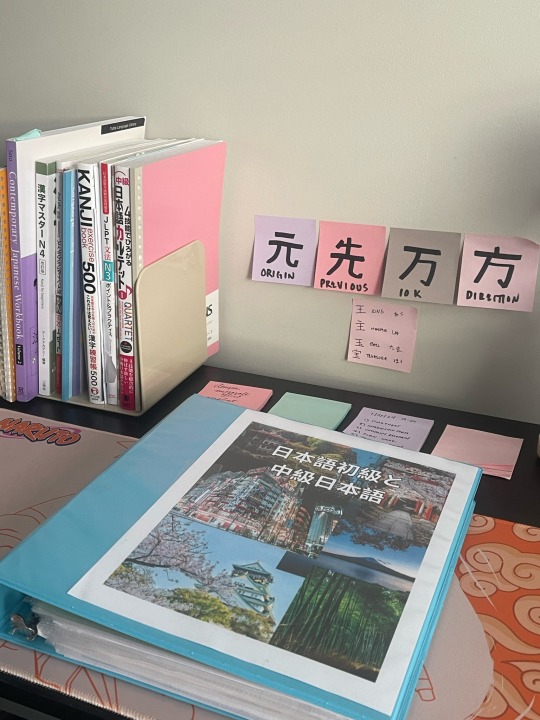#japanese langblr
Text
Podcast Review: ことのは

Podcast Title: 日本語の会話のpodcast −ことのは−
(にほんごのかいわのpodcast −ことのは−)
Available On: Spotify, YouTube
Ease of Listening: ★★★★★
Length of Episodes: ★★★★★
Level of Engagement: ★★★★★
Episode Frequency: ★★★★★
Overall: ★★★★★
Today I will be reviewing the Japanese conversation podcast ことのは (Kotonoha) by Yamamo-sensei and Kibi-sensei. They have episodes for all levels, separated by JLPT level N5-N1 and labeled so you can determine which episodes best suit your level or challenge yourself with a higher level.
Do I currently listen to this podcast?: Yes, I like this podcast a lot and listen to it frequently.
General Overview
Good For Levels: Beginner | Intermediate | Advanced
In this series, Yamamo and Kibi, two Japanese language teachers based in Japan, speak on a variety of topics in a conversation style of podcast. The conversation-style format is good for training your ear to listen to questions and responses, and every day banter between two speakers. They talk about Japanese culture and their own personal experiences which gives listeners an insight to the particulars of daily life in Japan.
Length of Episodes ★★★★★
The podcasts are usually around 20-30 minutes long. This is ideal for a commute or when you have some down time. They cover 2-3 subtopics within each topic they pick, so the conversations are very interesting and catch my attention and they don't seem too short or too long. They plan out each conversation topic carefully and keep it interesting and informative.
Level of Engagement ★★★★★
The conversation format is very engaging because they cover 2-3 subtopics within the main topic and structure the conversation to focus on each point of the topic. They keep the listener engaged with carefully planned-out topics and conversations, and there is obviously a lot of work that goes into their podcast. They match the vocabulary and pace of speaking with the level they are targeting, but even in the higher level podcasts I believe beginners would be able to catch the general flow of the conversation and challenge themselves to understand the content.
Episode Frequency ★★★★★
New podcasts come out once a week, and with the planning that goes into each episode it's a very good pace. There is also a lot of episodes already produced so you can go through them fairly quickly without running out of material.
Overall ★★★★★
This podcast is designed by two Japanese language teachers to convey information about Japanese culture completely in Japanese. The episodes are labeled by JLPT difficulty and I find the label system to be very accurate. It is a good podcast with which to practice your listening skills for every day conversation and to learn a bit more about Japanese culture.
#日本語#japanese language#japanese langblr#japanese studyblr#langblr#studyblr#japanese podcast#podcast review#tokidokitokyo
83 notes
·
View notes
Text
地震 (じしん) related words
April has been full of earthquakes in Taiwan.
In the past two days there's been so many earthquakes 🥺 I wanted to talk to my teacher about it, so here's the list of words I've collected.
Related pronunciations
地震 - earthquake
自信 - self-confidence
自身 - self
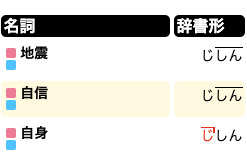
Related words
震度 (しんど) - seismic intensity
震度5強 (きょう) の地震があった。
There was an earthquake with a seismic intensity of strong 5.
余震 (よしん) - aftershock
大きな地震の後に何度も余震が続いた (つずいた)。
After the big earthquake, there were many aftershocks.
断層 (だんそう) - fault (geology)
その地域 (ちいき) は複数 (ふくすう) の断層が存在 (そんざい) している。
There are multiple faults in that area.
震源地 (しんげんち) - epicenter
震源地は市 (し) の中心部 (ちゅうしんぶ) 近くにあった。
マグニチュード - magnitude
その地震のマグニチュードは7.2だった。
The earthquake had a magnitude of 7.2.
地震計 (じしんけい) - seismometer
地震計が大きな揺れを検知 (けんち) した。
The seismometer detected strong shaking.
揺れ (ゆれ) - shake
地震の揺れがとても強かった。
The shaking from the earthquake was very strong.
Difference between マグニチュード and 震度
マグニチュード: total amount of energy released by the earthquake at its source
震度: how big you felt it in your local area
47 notes
·
View notes
Text
⛰️ 17 Sanity Challenge // Day 9 of 13 ✒️🤍
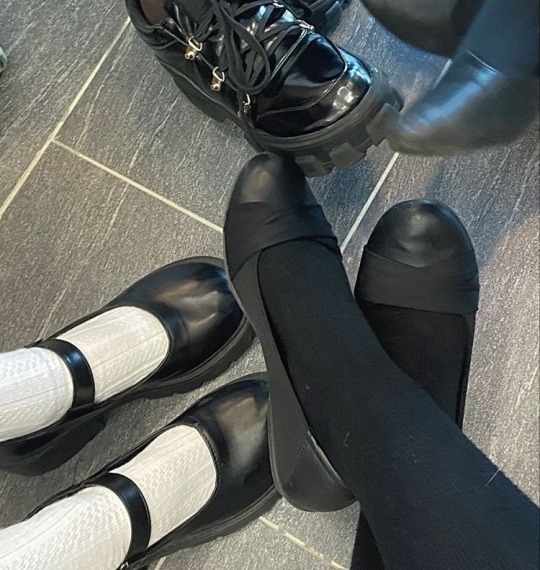


今天不错了!我觉得更好!昨天晚上我很好的睡觉 😇 而且生病后我再次可以好的吃 🐯 (today was not bad! i feel much better! last night i slept very well 😇 and after getting sick, i can eat well again 🐯)
🍊 my first time writing a dream journal! ☺️
🍚 refactored code to be much better than it was before 😌, made good progress and used new tools on bug investigation 🤓
🐸 loving kindness meditation
🍒 4/7 beginner ballet lessons complete!
😼 Japanese lessons (3x)
⚔️ talked to a new-ish friend! (we have mutual friends and hang out sometimes but never really talked 1:1 before!)
🦊 comparative cognition review
🐶🐻❄️ laundry fairy~ (jazzy bgm)
💌: 生活真的很好啊~ 🥰 我会继续努力所以我可以很好的完!加油!(life is really very good~ 🥰 i will continue to work hard so i can finish well! let's go!)

bonus: merci pour le tag @mochademic 😘 changed it up a bit since i did it recently 😉
last song: when was anyone gonna tell me this hidden gem 💎 by a rare seventeen sub-unit existed??
currently watching: started watching Tokyo Vice recently!
sweet/savory/spicy last snack: korean style pork jerky~~
relationship status social battery: 80% (higher than average)
current obsession: honestly, this challenge high-key slaps, if i do say so myself 🤓 i feel so motivated!!
study break time, friends!! 💙 @winryrockbellwannabe @casiopeasmiles @rose-learns-japanese @tokidokitokyo @megumi-fm
#studyblr#study motivation#study inspiration#save my sanity#langblr#chinese langblr#psychblr#japanese langblr#finals season#final exams#finals week#exams#exam season#finals#university life#student life#college life#university student#college student#astudentslifebuoy#heydilli#zesty's life#100 days of productivity#100 days of positivity#100 days of studying#100 days of self discipline#100 days of code#self improvement#self development#self love
21 notes
·
View notes
Text
Hey I need your help!
So I have memorized hiragana and katakana months ago already, but I have been stuck there since then because I have no idea what I should do next. I know some random kanji that I have memorized while looking for lyrics of some of まふまふ songs, but other than that I know little kanji or vocabulary in general; therefore, even though I can read hiragana and katakana I still can't comprehend what I am reading (tried reading posts on social media, level 0 books, etc etc)
So, does anybody have a specific roadmap with specific resources or smth cause I am really stuck?
29 notes
·
View notes
Text
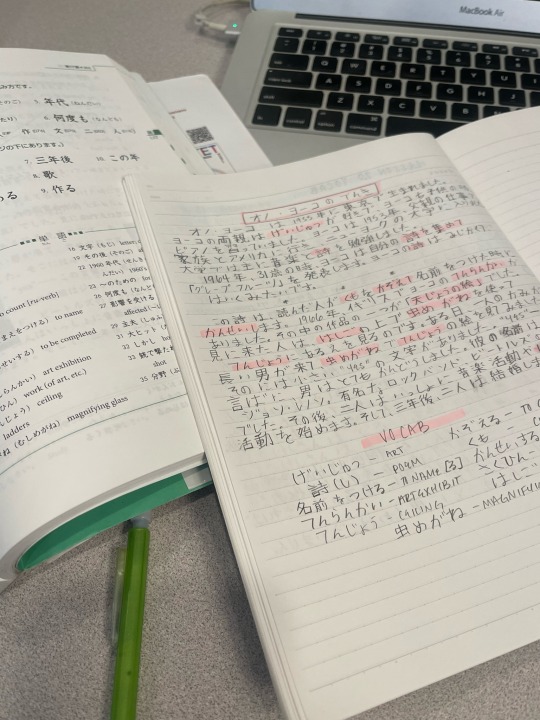
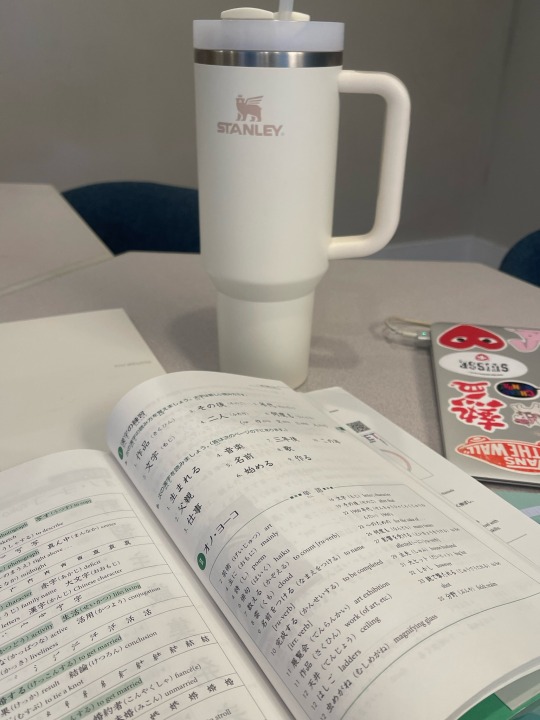
sunday studies 🕊️🍵📗
#studyblr#study blog#langblr#langblog#japanese langblr#japanese language#japanese#studyinspo#study motivation#study aesthetic#study desk#exam study#student blog#learning japanese#language blog#language learning#student life#studying
552 notes
·
View notes
Text
接続詞(せつぞくし)
conjunctions - words that are used to link phrases together
情報を加える // Adding information:
しかも besides
そのうえ moreover, on top of that
さらに moreover, on top of that
そればかりか not only that, but also...
そればかりでなく not only that, but also...
情報を対比する // Putting into contrast:
それに対して in contrast
一方 whereas
他の可能性・選択肢を言う // Giving alternatives:
あるいは or perhaps (presenting another possibility)
それとも or (presenting another option within a question)
結論を出す// Drawing a conclusion:
そのため for that reason
したがって therefore
そこで for that reason (I went ahead and did...)
すると thereupon (having done that triggered sth. to happen)
このように with this (adjusting a conclusion to the arguments given beforehand)
こうして in this way
理由を言う // Giving a reason:
なぜなら...からだ the reason is
というのは...からだ the reason is
逆説を表現する // Expressing a contradiction:
だが however, yet, nevertheless (contradicting what one would have expected)
ところが even so (spilling a surprising truth)
それなのに despite this, still
それでも but still (despite a certain fact, nothing changes)
説明を補う // Amending one's explanation:
つまり that is, in other words (saying the same thing using different words)
いわば so to speak (making a comparison)
要するに to sum up, in short
説明を修正する // Revising one's explanation:
ただし however (adding an exception to the information stated beforehand)
ただ only, however
もっとも however (obviating any expectations that might arise through the previous statement)
なお in addition, note that (adding supplementary information)
話題を変える // Changing the subject:
さて well, now, then (common in business letters after the introductory sentence; is often ignored in tranlations)
ところで by the way
#文法#grammar#conjunctions#japanese grammar#jlpt n2#japanese langblr#japanese language#language#japan#japanese#japanese vocabulary#langblr#linguistics#studyblr#study blog#studyspo#study motivation#study aesthetic#study notes#learning japanese#nihongo#日本語#日本語の勉強#light academia#light acadamia aesthetic
653 notes
·
View notes
Text
神無月 (kan-na-zuki) "October" (archaic)
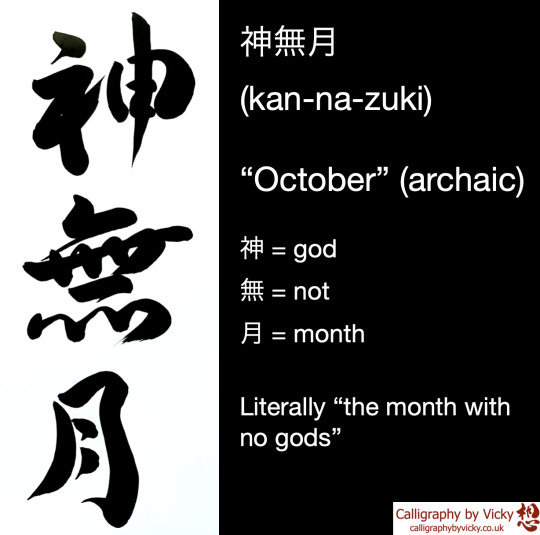
神 = god
無 = not
月 = month
The modern Japanese word for October is 十月 (literally "10th Month), however in the old-fashioned calendar is was known as 神無月, or "the month with no gods".
In October, all the gods in Japan (there are believed to be 8 million of them) go to Izumo Shrine in Shimane Prefecture for a meeting, thus leaving most of Japan with no gods.

The huge shimenawa (sacred rope) at Izumo Shrine.
#Japanese#kanji#Japan#Japanesecalligraphy#書道#October#十月#神無月#japanese language#japanese culture#japanese calligraphy#japanese art#calligraphy#japanese langblr
923 notes
·
View notes
Text
Japanese Reading Resources for Absolute Beginners
A question I encounter often is "How much Japanese should I study before I can begin reading in Japanese?"
From my experience as a learner and reader myself and from managing a Japanese book club for other learners I can honestly say that you can start way earlier than you probably think!
There are many resources that only require knowing hiragana. Those texts usually teach vocabulary through pictures and only use basic grammar.
Some are even simpler than that: The Japan Foundation's Hiragana Books are great for those, who are still remembering hiragana characters. Every short book introduces only 1-2 new characters, so it's a great reading exercise for those who've just started.
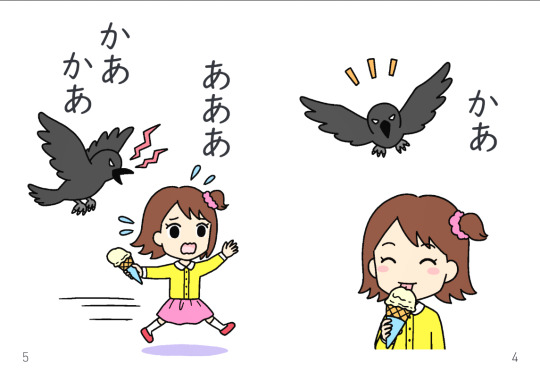
The free graded reader 「どうぞ、どうも」 by the NPO Tagengo Tadoku only uses the words 「どうぞ」 and 「どうも」 to write an entire story. Again, this makes for a great exercise in reading hiragana and understanding context. Another "level 0" recommendation by the same NPO would definitely be 「しろい?くろい?」. This book uses the full range of hiragana characters but the grammar is simple and all used vocabulary is illustrated.
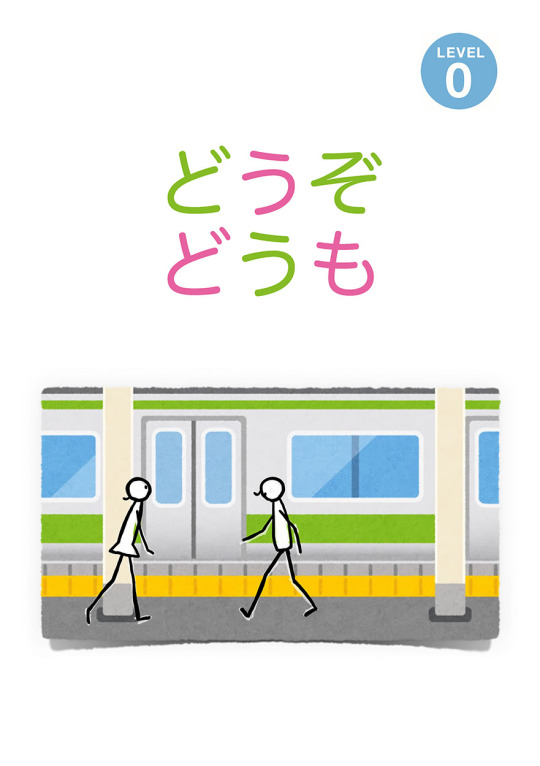
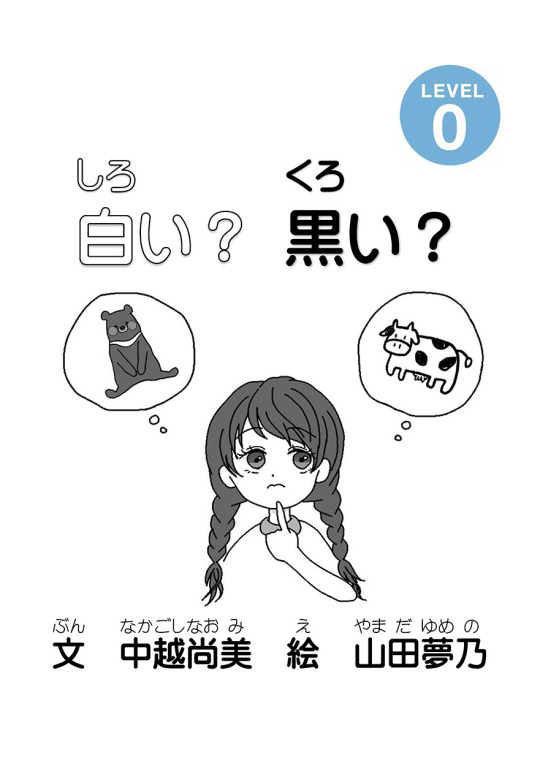
Another site with great resources for absolute beginners is Nihongo Tadoku Dōjō. If you have memorized both hiragana and katakana and know how the particles を and で work you will be able to read this text about stationary (ぶんぼうぐ) and understand everything by looking at the pictures!
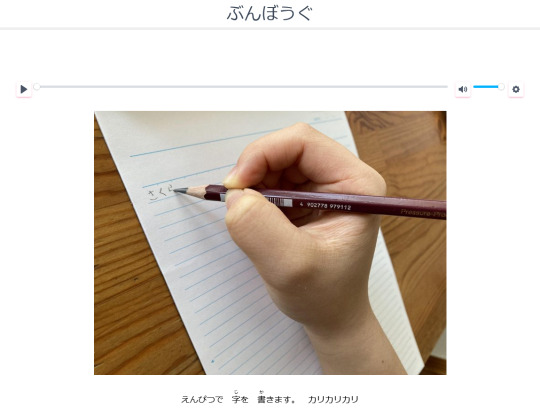
The resources linked so far can all be accessed completely free on the linked websites. If you have the money to spare, please also have a look at the box 「スタート」 from the series reberubetsu nihongo tadoku raiburarī published by the NPO Tagengo Tadoku and ASK (affiliate link). This box includes 8 little books in very simple Japanese.
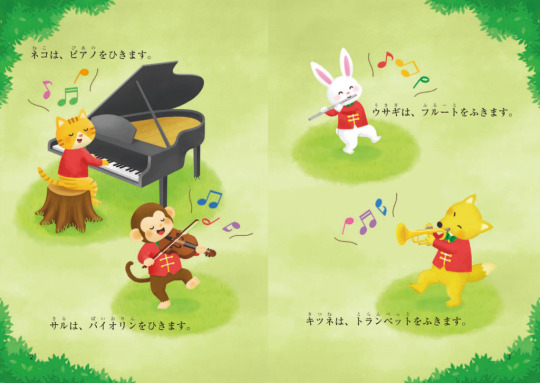
All these texts for absolute beginners will get you started reading in Japanese with very little knowledge of characters and vocabulary.
Reading in Japanese is a skill that requires practice. But once you get used to it, it can be such a valuable tool to reinforce new vocabulary and grammar. So please don't wait until you're "ready" before you start reading - start early at your own level!
#my book reviews#reading in japanese#study japanese#learning japanese#日本語#japanese books#やさしい日本語#free graded readers#free tadoku graded readers#nihongo tadoku dōjō#absolute beginner level#japanese langblr#japanese language#japanese reading comprehension#japanese free reading resources#japanese reading resources
644 notes
·
View notes
Text

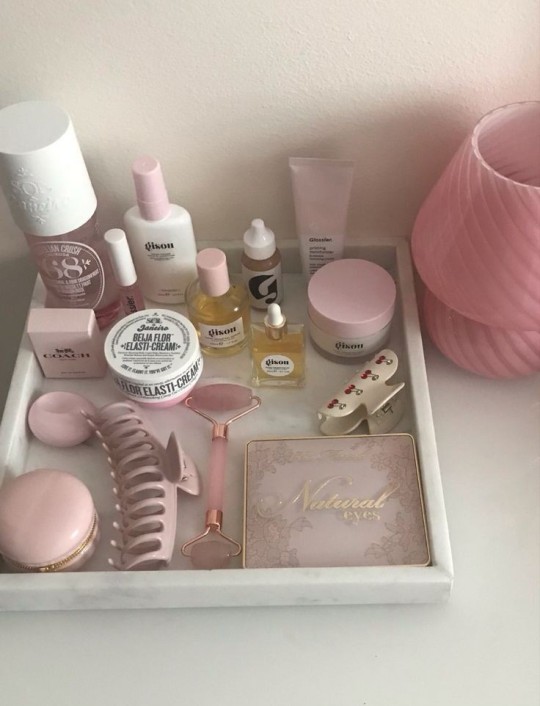

My Morning Routine 🎀
I have adopted a new morning routine because I didn't have one for honestly the last....4 months? Eeeeessshh, absolutely not good for me. I've had to tweak the routine this week, but I think I've got it down! I wake up between 5am and 6am, typically closer to 6am, but it depends on the days because Fridays, Saturdays, and some Sundays I have to leave my house by 7/7:30am. I typically have 2 hours for this routine which is perfect for me!
Current Morning Routine 💗
Wake up between 5am and 6am
Drink water, use the bathroom
Make my bed
Do a quick Yoga with Adriene morning yoga workout, then put yoga mat away
Write in my guided journal
Complete a morning journal prompt of choice in my other journal
Make an Iced Coffee (medium roast Coffee k cup , one sweet n low packet, splash of French vanilla creamer)
Read 1 Chapter OR 15/20 minutes (typically self help book but honestly any book is fine for me!)
Plan out some things for the day (planner, Google Calendar, brain dump list, review todo lists for day)
Shower/Wash face (depends on if I showered night before)
Do my morning skincare! (vitamin c serum, moisturizer, sunscreen, lip balm)
Get dressed for the day (either work clothes or normal outfit depending on what i have to do)
Pack my bag(s) for the day (again, depends on the class, and if I have work then I may take a 2nd bag)
Head out (if necessary, which it typically is, except for most Sundays!)
And that's my morning routine! I love it so much, it's been so nice waking up at a set time every day and has been forcing me to be more mindful of when I go to sleep and how much caffiene I am consuming. It's so nice to have a morning routine, and I am currently working on implementing a night routinebecause I thrive with routines!
til next time lovelies 🩷
#pink pilates girl#pink pilates princess#self care#self development#self love#wonyoungism#it girl#health & fitness#mental health#physical health#girly stuff#studyblr#study blog#langblr#spanish langblr#japanese langblr#that girl energy#becoming that girl#that girl#it girl self care#it girl energy#pink blog#pink academia#pilates aesthetic#pink aesthetic#college student#uni student aesthetic#university student#student life#green juice girl
333 notes
·
View notes
Text
IRL Japanese 2: Things the kids I teach say all the time
If you're planning to work as an ESL teacher in Japan working with kids, this vocab is gonna be super useful for you! You'll pick up a lot as you go along, but it's good to have an overview from the start.
できた = done, finished (whenever they finish an exercise I've set them. The older kids will use the ます-form, but kids under like age 8 will use this one)
かえる?= is it time to go home? (lit: go home?)
わかった = got it (again, the older kids will use the ます-form)
わからない / わかんない = I don't get it (idk if わかんない is just dialect or if it's common overall, but I hear it more than わからない. Usually from the kids who don't wanna be there and are making zero effort)
ちがう = wrong / different (when they give an answer but realise it's not correct. It's basically like "wait, no")
ばか = idiot (sometimes boys say this to their friends)
全部?(ぜんぶ)= everything?! (asked in disbelief when I ask them to write more than one word)
やめろ = stop it! (used with friends when they're teasing each other)
いたいよ = that actually hurts, you know! (used with friends when they're rough-housing)
よし (more like 'yoshhh') = right then (filler word indicating the start of an activity or a change of activity)
水筒(すいとう)= water bottle (most kids bring one to class and frequently forget to take them with them when they go home)
忘れた(わすれた)= I forgot (usually in reference to the text book they left at home)
トイレに行きたい = I want to go to the bathroom
先生、大好き!(せんせい、だいすき!)= I love you, Sensei!
Other useful classroom/school vocabulary:
サイコロ = dice
トランプ = playing cards
ごろごろ = onomatopeia for the sound for rolling (I found the kids got confused if I just mimed rolling a dice/ball and said "roll!" but if I did the gesture and said "gorogoro", they understood)
ビリビリ = onomatopeia for ripping (useful for when you have tear-apart crafts in class)
ケシケシ = onomatopeia for erasing something (useful when you try to explain to a kid they spelled something wrong. Because it's easier to just say "A kesh-kesh, E" than "Not A, E. Okay great you wrote E, but A needs to go. No no no not the whole word, just A. Oh my God. Okay. Let me write it and you copy.")
ちょっと = a little, soon, wait a little (useful if the kids are getting a bit antsy and ready to go home a bit too early/don't want to wait their turn. Don't use it with parents though!)
がんばれ = do your best / you can do it!
あぶない!= dangerous / look out! (useful if a kid unexpectedly runs in front of me while I'm carrying a table)
せえの!= Altogether now! (When I need the kids to repeat something after me)
だめだよ = Don't do that (for when the kids repeatedly do something I've asked them not to do)
少々お待ちください(しょうしょう おまち ください)= polite form of "please wait a moment". Useful if you have a parent talking to you and you need to go get something (e.g. a communication sheet for them to point at so you know what they're trying to say)
授業参観 (じゅぎょうさんかん) = parent observation (PO). A couple of times a year, parents are invited into the classroom to watch the lesson (absolutely not a thing in the UK, not sure about other countries). The past two months I've had POs at my various schools, and so the parents come to the door and ask me if it's PO week. I don't understand most of the question, but I can pick out this one word and a question particle and figure out what they're asking.
It's also obviously a good idea to learn vocabulary related to stationery (eraser, pencil, crayon, pen, notebook, textbook, pencil case etc) because kids forget/lose their stuff all the time and will inevitably ask you if they can borrow something.
504 notes
·
View notes
Text
欲張り
よくばり
greed, avarice, covetousness, greedy person
持てば持つほど、欲張りになる。
もてば もつ ほど、よくばり に なる。
The more you have, the more you want.

#日本語#japanese#japanese language#japanese langblr#japanese studyblr#langblr#studyblr#単語#語彙#japanese vocabulary#tokidokitokyo#tdtstudy
25 notes
·
View notes
Text
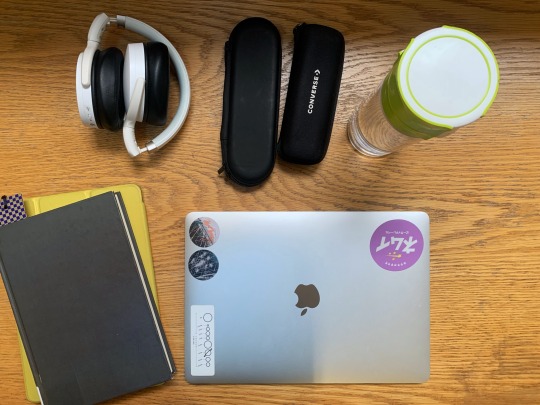

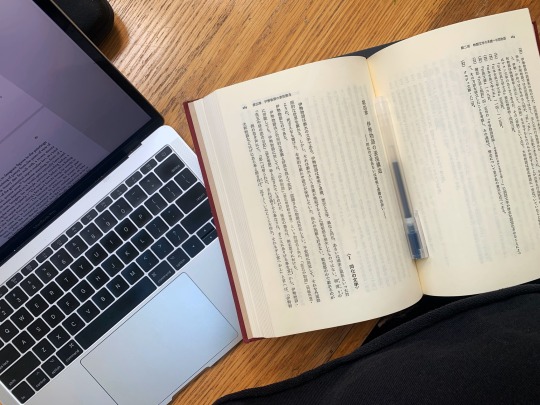
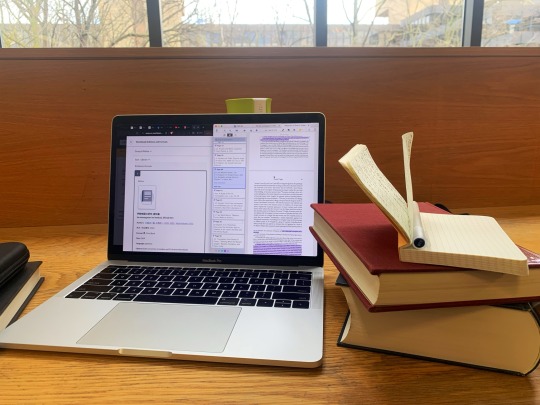
2/4;
library day. diving into the japanese sources for my dissertation. rough, but encouragingly doable! so proud of how far my japanese has come this year!
🎧: patricia - florence and the machine
257 notes
·
View notes
Text
increasingly "useless" reasons why i like learning languages
@studentbyday said i should re-define "useless" in my mind. instructions unclear. made a shitpost instead 💩

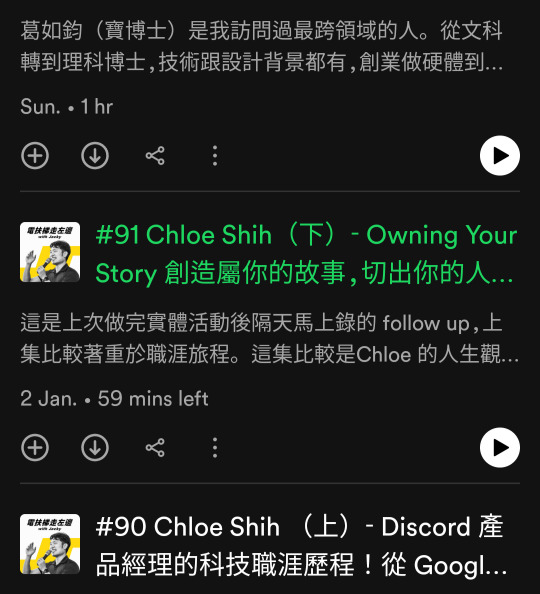

💌: inside-my-phone format is back!🍃 do you agree/disagree with my MTL rankings? what motivates you? 👀
i can be a more empathetic, understanding, and supportive person who makes sure to only cuss people out in languages they don't understand so that their feelings aren't hurt ❤️
i can talk to more people who will probably think i'm an idiot because of how badly i speak their language 👄
i can nurture my self-confidence/-esteem as long as i don't think too hard about how much i don't know 🥰
i can read more books, articles, people arguing on the internet, etc. 📚
i can travel to foreign countries more easily until someone asks me to translate something important and i mess up and land us both in prison or something ✈️
i can unlock new work opportunities until someone asks me to translate something important and i mess up and land us both in prison or something 💼
i can multitask better even though i shouldn't even be doing it in the first place 🤹♀️
i can watch my favorite shows/listen to my favorite songs without subtitles/translations so that my brain rot can continue in peace 📺
i can, on the other hand, stop losing brain cells?? 🧠
i can eavesdrop on more people, probably at the grocery store 🙉
i can show off at work and other places where it is appropriate to show off irrelevant skills ✨
sex appeal?? 🥵
#langblr#studyblr#study motivation#study inspiration#korean langblr#chinese langblr#japanese langblr#korean studyblr#chinese studyblr#japanese studyblr#learning languages#language learning#language lessons#duolingo#zesty's life#languages#multilingual#multilanguage#bilingual#motivation#humor#shitpost#self development#self improvement#study blog#study aesthetic#light academia#dark academia#chaotic academia#polyglot
290 notes
·
View notes
Text
いろどり · irodori - Japanese for life in Japan
(。•̀ᴗ-)✧ resources

IRODORI is a useful website made by The Japan Foundation. It is a series of 3 textbooks, with audios and materials completely free, focusing on developing skills useful for life in Japan.
Whether you are planning to come to Japan in the future and want to learn what you should be able to do before you arrive, or whether you are already living in Japan and wish to check your Japanese ability and increase the number of things you can do, we sincerely hope that this textbook will help you achieve your goals. - "what is irodori" website page.
The textbooks are super organized, divided in: starter (A1), elementary 1 and elementary 2. Finishing elementary 2 means having an A2 level [At A2 level, you can hold short, basic everyday conversations on familiar topics.]
I recommend styling your learning method with the goal you have in mind. You can understand more about it reading the post I made.
Hope it was helpful! Let me know and let's share resources~
またね~@inkichan
꒰ა ˚₊ ✧・┈・╴﹕꒰ ᐢ。- ༝ -。ᐢ ꒱﹕╴・┈・𐑺 ‧₊˚໒꒱
#japanese#nihongo#studyblr#japanese langblr#langblog#japanese studyblr#日本語#resources#japanese resources#free resources#japanese free resources#textbook#free#free textbooks#pdf#japanese pdf#learn japanese#learning japanese
567 notes
·
View notes
Text
Basic quantifiers in Japanese
台 (だい) - used for cars, bicycles, machines, mechanical devices, household appliances
杯 (はい) - used for cups and glasses
匹 (ひき) - used for small animals
本 (ほん) - used for long and thin objects
階 (かい) - used for floors
回 (かい) - used for occurrences, numer of times
個 (こ) - used for things that are small and round
枚 (まい) - used for thin and flat objects
人 (にん) - used for people (but we say 一人 (ひとり) for one person and 二人(ふたり)for two
冊 (さつ) - used for books
歳 (さい) - used for age
Plus general quantifiers:
一つ (ひとつ)
二つ (ふたつ)
三つ (みっつ)
四つ (よっつ)
五つ (いつつ)
六つ (むっつ)
七つ (ななつ)
八つ (やっつ)
九つ (ここのつ)
十 (とお)
#japanese#langblr#japanese langblr#vocabulary#japanese language#studyblr#japanese vocabulary#food vocabulary#vocabulary list#learning japanese#mine
779 notes
·
View notes

